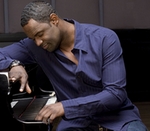Create Your Music
Easily learn music theory for:
- A music career
- Getting paid for your skill
- Teaching
- Leveling up your Art
1. Music Letters
Similar to the ABC's, music theory goes from A - G, and stops:
This musical alphabet respresents the sounds our instrument and voice produce. Sound is what music theory structures. Together, we'll improve our sound output.
Additional steps, or sounds fall between these letters:
In the infinite range of sounds, instruments at first could play only one tone. A letter was assigned to that particular sound. From there, higher and lower sounds each received their own letter; their partners are sharps(#) and flats(b) between the letters (abcdefg).
2. Sharps and Flats
Sharp

A Sharp is like a nail that points up. It raises letters a half step. So the sound goes up, as from A (step) B. Now it's called A (sharp) B. Keep going up the musical alphabet:
We'll get to those missing steps later. Just know the sound is going up half steps, called Sharps. The symbol for Sharp in music is '#' (the number, or pound, or hash mark, symbol):
Flat

brian mcknight
A Flat is the tire that nail punctured. Just like a flat will deflate, and bring us down too, the sound goes down a half step. B (step) A now becomes B (flat) A, as the sound goes down a half step. The musical alphabet downward:
We start on G because we need to reverse the direction of the sound. Flat's symbol looks like a lowercase 'b':
3. Half Step Exceptions

kelly clarkson
In the musical alphabet, some letters have no steps, or in-between notes. Again, the steps between the letters are:
These steps are now either # Sharp or b Flat. The steps between ABCDEFG with Sharps and Flats:
BC , EF
Notice that there are no steps between B and C, and between E and F. This means when we play a B# (B sharp), we are playing the letter C. And when we play an E# (E sharp), we are playing an F.
B# = C , E# = F
CB , FE
Conversely, when we play a Cb(C flat), we are playing the letter B. And when we play an Fb(F flat), we are playing an E.
Cb = B , Fb = E
Therefore, both B to C, and E to F have no between steps:
We may remember the BC,EF exception, with the phrase:
Welcome all musicians!
Recommended reading: Sharp Flat Rule
The next page introduces a combination of half and whole steps to make scales.
